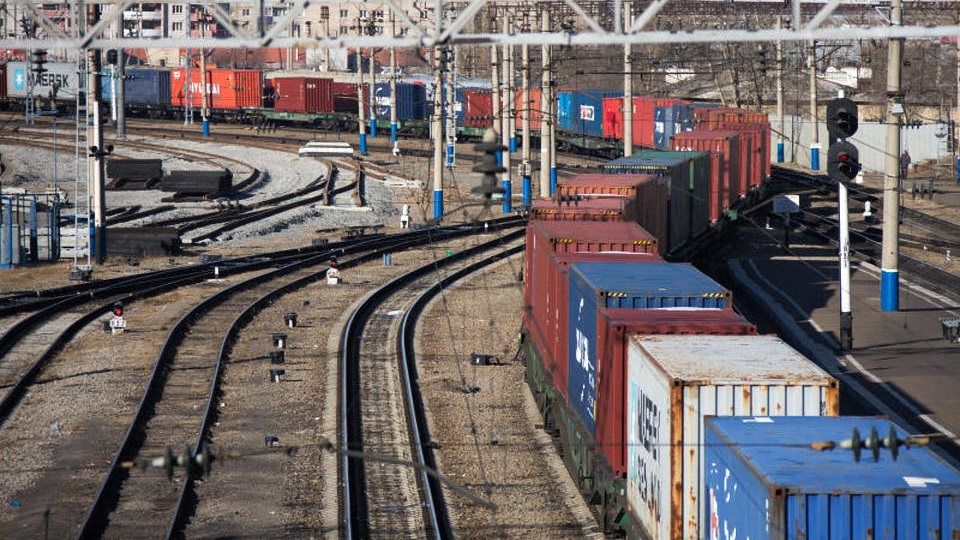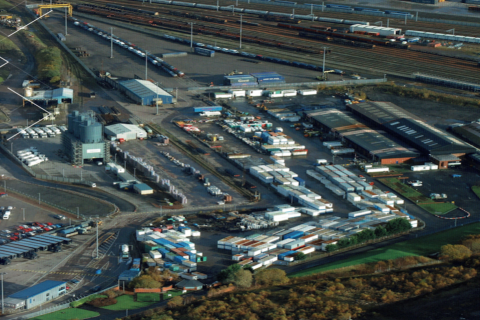Russia eyes distribution centres on EU border

Russia is looking for new, modern distribution centres just at the border with Europe. In this way, it wants to facilitate the large cargo volumes between Europe and Asia, while at the same time be able to quickly distribute smaller volumes. This was explained by RZD Logistics, one of the main rail freight operators in the country.
At the moment, the operator has teamed up with neighbouring railway company Belarusian Railway, looking for the opportunity of using transport and logistics center Kolyadichi as a distribution center for goods delivered to Europe from China. This center is located in close proximity to Minsk and has a processing capacity up to 100 thousand TEUs per year, the company explains.
Terminal policy
RZD Logistics will be represented at the conference Improving Rail Terminal Efficiency in the Netherlands. Here, Alexander Mironov will take part in a discussion about terminal policy. What is the interaction between an operator and a terminal? Who is responsible for a successful supply chain? These are some of the topics to be discussed.
RZD Logistics cooperates closely with the terminals, the company points out. It offers terminal handling of cargo and its customs clearance. With regards to the latter, it applies inland customs clearing: cargo coming from China is not checked at the border, but at the main receiving terminal Freight Village Vorsino, nearby capital Moscow. From here, it is distributed to other locations.
Short lead times
With the launch of each new railway service, the efficiency of terminal and warehouse infrastructure usage increases. This allows the company to guarantee short delivery times, the operator explains. “In Russia, distances are very different from the ones in Europe. This enables short transit times for cargo delivery from China to Europe.”
“The road map of Europe is highly developed, making fast delivery to any point possible. Around ten years ago, you would only look at Hamburg, which was then a center of freight logistics for all Europe. This development allows RZD Logistics to test new arrival points for trains to Europe and open new routes. Russian Railways, for its part, makes a big contribution to the development of transit shipments by keeping the railway rate on the same level for seven years”, RZD Logistics explains.
Europe-China
The geography of shipments from China is expanding day by day, the company continues. Centre point in handling this cargo flow is Freight Village Vorsino. “The effective work of this terminal helps to process cargo coming from popular directions as Guangzhou, Shanghai, Shenzhen, Beijing, Suzhou and other cities.”
“One of main signs of the improvement of terminal services is the launch of a new transit container route going in the direction China-Europe-China. For instance, the alternative transit route for containers from China to Europe across the port Bronka. Multifunctional Sea Cargo Complex Bronka has the capacity to consolidate in one train cargo going to different points in Europe. In other words, a train may be sent from any province of China, with cargo heading for Scandinavia or Germany.”
It continues: China, for its part, is extremely interested in the development of terminal infrastructure not only on its own territory, but at the entrance to Europe as well. This, in particular, made possible large-scale projects as the China-Belarus industrial park Great Stone, which combines the functions of a logistics and industrial hub.
Digitalisation
Terminals in Russia are currently working actively on the automatisation of internal processes and the implementation of the electronic document. The Latvia-Belarus-Russia corridor recently implemented the use of digital invoices on the 1520-millimetre-gauge network. Freight Village Vorsino participates in the realisation of projects as ‘Digital container terminal’ and ‘Smart logistics’, the company said. “The main goals of these initiatives are the digitalisation of transport solutions, switching to an electronic document flow and improvement of business processes.”
The conference Improving Rail Terminal Efficiency takes place on the last day of the three-day exhibition fair called the Freight and Terminal Forum. As part of the larger RailTech Europe 2019, this event is held from 26-28 March 2019. Registration for this event is already open.
You just read one of our premium articles free of charge
Want full access? Take advantage of our exclusive offer





